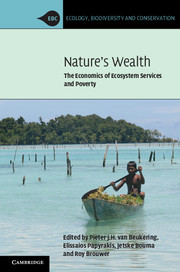Book contents
- Frontmatter
- Contents
- List of contributors
- Acknowledgements
- 1 The economics of ecosystem services and poverty
- Part I Biodiversity-related ecosystem services
- Part II Marine-related ecosystem services
- Part III Forest-related ecosystem services
- Part IV Water-related ecosystem services
- Part V Land-related ecosystem services
- Index
Part III - Forest-related ecosystem services
Published online by Cambridge University Press: 05 July 2013
- Frontmatter
- Contents
- List of contributors
- Acknowledgements
- 1 The economics of ecosystem services and poverty
- Part I Biodiversity-related ecosystem services
- Part II Marine-related ecosystem services
- Part III Forest-related ecosystem services
- Part IV Water-related ecosystem services
- Part V Land-related ecosystem services
- Index
Summary
Forest-related ecosystem services
Compared to many other ecosystems, the link between forest and poverty is well researched (see Angelsen and Wunder 2003, Arnold and Bird 1999, Kerr and Pfaff 2004, Kumar et al. 2000, Scherr et al. 2003). One perspective on the relationship between poverty and forest is the level of dependence of people on forest ecosystems. Around 410 million people (including 60 million indigenous people) live in, or at the fringes of, tropical forests (Wiersum and Ros-Tonnen 2005), and more than 1.6 billion people living in extreme poverty are estimated to depend on forests for some part of their livelihoods (World Bank 2004, WRI 2005). Alleviating poverty in these areas is therefore unachievable without taking into account the forestry–poverty nexus.
Another perspective on the link between poverty and forest is the possible existence of a negative downward spiral of poverty and environmental degradation. This negative spiral has long been considered valid for the forest sector. Micro-level studies illustrated that poverty may leave people no other option but to clear forest cover in order to gain access to land for cultivation or to use natural resources in an unsustainable manner (Deininger and Minten 1999, Kerr and Pfaff 2004). According to the MEA (2005), more forest was converted to cropland in the 30 years after 1950 than in the 150 years between 1700 and 1850. This conversion rate accelerated further after the 1980s and mainly takes place in developing countries. However, macro-economic studies failed to prove the validity of this generalization for the relationship between poverty and deforestation (Brown and Pearce 1994a, Sunderlin et al. 2006). Claiming poverty to be the main underlying cause of deforestation is inaccurate, particularly since deforestation is sometimes undertaken by wealthy commercial interests (Chomiz 2006, van Beukering et al. 2003). Moreover, various studies also show that poor people do invest considerable time and resources in forest management (Arnold and Bird 1999).
- Type
- Chapter
- Information
- Nature's WealthThe Economics of Ecosystem Services and Poverty, pp. 173 - 182Publisher: Cambridge University PressPrint publication year: 2013



